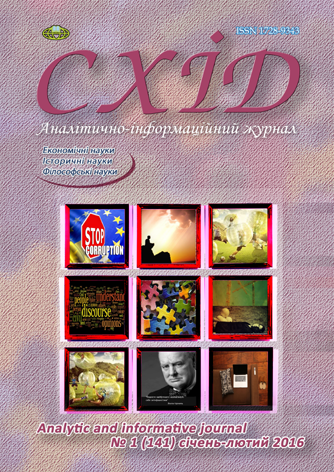Narrative strategies of modern Ukrainian Protestantism
DOI:
https://doi.org/10.21847/1728-9343.2016.1(141).64819Keywords:
narrative, narrative of liberation, Ukrainian Protestantism, tradition, theology of "postpostmodernism"Abstract
The article examines the narrative strategies of Ukrainian Protestants for new translations of stories about their own tradition and to create posttraditional discourse about a "new Reformation" of postmodern era. The features of a narrative interpretation of Ukrainian Protestant of their churches in the postmodern context is comprehensively investigated. It is noted that in a in circumstances of ineffective of traditional sermon is attempt recovery of Protestant churches by the way of "new Reformation". It is found that the main narrative of the modern Ukrainian Protestant theology is the narrative of liberation "Exodus from Egypt" (Soviet and imperial totalitarianism) to a state of personal and social freedom. It is proved that narrative ideal of "postpostmodern" is a kind of romanticism in Theology, by kinship with the ideals of radical orthodoxy of Western Protestantism and concepts of Russian religious philosophy. The specificity of narrative ideal of "postpostmodern" is to claim deconstruction of modern and postmodern by it's alteration, but not fundamentalistic reconstructing of traditions. The emergence of theology of postpostmodern in Ukraine is caused by events of Maidan and the subsequent crisis and a response of Protestant theological environment to contemporary challenges.
Downloads
References
Denisenko A. (2012), Intelligent climate postsecular era: delineating the boundaries of contemporary theological discourse, Fіlosofska Dumka-Sententiae: Special Issue, №3, Vinnytsia, pp. 41-60 (rus-ukr).
Denіsenko А. (2012), Мission of "Radical Orthodoxy" as a theological deconstruction of the concept of "secular", available at: http://www.religion.in.ua/main/bogoslovya/15348-radikalnaya-ortodoksiya-kak-bogoslovskaya-dekonstrukciya-ponyatiya-sekulyarnyj.html (rus).
Denіsenko А. (2013), Theology of protest: when, what for and why the Christian must be involved in the revolution?, available at: http://www.ideas4god.com/2013/11/29/teologiya-protesta-kogda-zachem-i-pochemu-xristianam-neobxodimo-uchastvovat-v-revolyuciyax/ (rus).
Nagirnyak А. (2014), Devotees of faith, Knyhonosha, Кyiv, 307 p. (rus).
Puzynin А. (2010), Tradition of Evangelical Christian: Exploring identity and theology from its beginnings to the present, BBI,Moscow, 523 p. (rus).
Raychinyets А. В. (2010), Erected by God, Dukhovnoye vozrozhdeniye, Оdesа, 147 p. (rus).
Religious and Philosophical Notebooks. Notebook № 1. Proceedings of the First Evangelical Counсil. For strategy of the evangelical movement (2010), Na Rusi,Moscow, 60 p. (rus).
Religious and Philosophical Notebooks. Notebook № 9. Proceedings of the Fourth Evangelical Counсil. Church in the city space, (2014), Na Rusi,Moscow, 60 p. (rus).
Cherenkov М. (2012), Baptism without quotes. Essays and materials to the debate about the future of evangelical churches, Коllokvium, Cherkasy, 291 p. (rus).
Cherenkov М. (2008), European Reformation and evangelical Ukrainian Protestantism (genetic and typological affinity and national identity dimensions), Khrystyianska prosvita, Оdesa, 566 p. (ukr).
Cherenkov М., Bachinin V. (2015), When it is impossible to remain silent, The Protestant Ethic and the Spirit of …ostmodernism, Knyhonosha, Кyiv, pp. 180-368 (rus).
Popov A. (2010), The Evangelical Christians-Baptists in the Soviet Union as a hermeneutical community: Examining the identity of the All-Union Council of the ECB (AUCECB) through the way the Bible was used in its publications. Ph.D. diss., University of Wales and International Baptist Theological Seminary, 352 p.
Downloads
Published
How to Cite
Issue
Section
License
Copyright (c) 2016 Sergii Stavroiani

This work is licensed under a Creative Commons Attribution-NonCommercial-NoDerivatives 4.0 International License.
1. Authors bear responsibility for the accuracy of facts, quotations, numbers and names used.
2. Manuscripts are not sent back.
3. The publisher does not always agree with the authors' opinion.
4. The authors reserve the right to authorship of the work and pass the first publication right of this work to the journal under the terms of a Creative Commons Attribution-NonCommercial-NoDerivatives 4.0 International License. This license allows others to distribute (copy) the published work for non-commercial purposes, provided there is mandatory attribution to its authors and a link to the first publication in our journal.
5. The authors have the right to conclude separate supplement agreements that relate to non-exclusive work distribution in the form in which it has been published by the journal (for example, to upload the work to the online storage of the journal or publish it as part of a monograph), provided that the reference to the first publication of the work in this journal is included.

